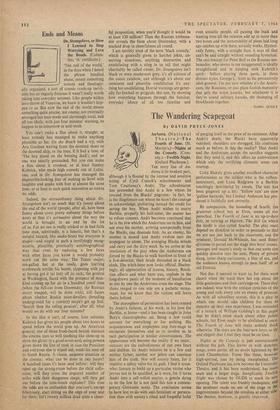The Wandering Scapegoat
By DAVID PRYCE-JONES
Anlorra. (N ational Theatre.)—The Fourth of June. (St. Martin's.)—Nights at -60v4 the Comedy. (Com- (Oxford Playhouse.) THE story line of An-
dorra is its weakest part, although it is floated by the intense and sensitive acting of Cyril Cusack's schoolmaster and Tom Courtenay's Andri. The schoolmaster has pretended that Andri is a Jew whom he rescued from the Blacks' pogroms: in fact, he . is the illegitimate son whom he hasn't the courage to acknowledge, preferring instead the credit for saving the boy. When Andri wishes to marry Barblin, properly his half-sister, the master has to refuse consent. Andri becomes convinced that he is the Jew which the Andorrans see in him, and not even his mother, arriving unexpectedly from the Blacks, can dissuade him. As an enemy, his mother is stoned and Andri evolves into the scapegoat to atone. The avenging Blacks invade and carry out the dirty work. So we arrive at the resolution of the play when the Andorrans are forced by the Blacks to walk barefoot in front of a Jew-detector, their heads shrouded in a black cloth. The witch-hunt now looks official. Shatter- ingly, all appreciation of ironies, history, Brech- tian effects and what have you, explode in the long-drawn panic of the moment of humiliation as one by one the Andorrans cross the stage. The shoes ranged to one side are a pathetic monu- ment, for we know that the victims will leave theirs behind.
The atmosphere of persecution has been created by Andri's failures, at his work, in his love for Barblin, at home—and it has been caught in John Bury's claustrophobic set. Being a Jew could account for everything or for nothing. His acquaintances and employees step fore-stage to exonerate themselves and so to involve us in tacit participation in similar circumstances. The appearance will become the reality if we insist: outcasts are the embodiments of our own fears and dislikes. So Andri believes he is a Jew and neither father, mother nor priest can convince him of the truth. Nor will society listen, for it requires a safety valve for its guilt. I find it some- what literary to build up a particular victim who proves not to be qualified, as it were, for it turns Andri into a self-willed martyr, a gentile dying to be the Jew he is not (and this hits a contem- porary Germanic note). The conclusion seems to have less to do with anti-Semitism or persecu- tion than with society's ritual and forgetful habit
of purging itself as the price of its existence. After Andri's death, the Blacks have apparently vanished, shoulders are shrugged, life continues much as before. Is this the reality? That Andri and the Andorrans accept the sacrifice suggests that they need it, and this offers an ambivalence which only the terrifying climactic scene can overtop.
Colin Blakely gives another excellent character performance as the soldier who is the ruffian- instrument, and Lynn Redgrave is a Barblin touchingly bewildered by events. The text has been gingered up a bit: 'Yellow rats' are now 'gutless bastards,' but Lindsay Anderson has pro- duced it faithfully and correctly.
By comparison, the hounding of Scarfe, the grammar school boy at Eton, seems all too parochial. The Fourth of June is an up-to-date Eric, or turning to Harrow, The !lilt (in which the Misfit is also called Scarfe). The play must depend on direction in order to persuade us that we are not just back in the classroom, and the producer, Donald McWhinnie, has used flimsy divisions to parcel out the stage into boys' rooms, passages and master's study so that one scene can quickly dissolve into the next. Plenty of private slang, some sharp caricatures, a blur of sex, and the audience knows enough to pass itself off as old Etonian.
Not that it seemed to want to, for there were cheers when the maid blew her top about the little gentlemen and their carryings-on. There they are indeed, wise with the antique cynicism of the young and rich, every one an enemy of promise. As with all schoolboy stories, this is a play to which one should take children for them to measure up their own experience. I was reminded of a remark of William Golding's in this paper that he didn't mind much about other public schools, but Eton ought to be abolished at once. The Fourth of June will make nobody think otherwise. The stars are the four new boys, so slY and elegant that I feel they must be on loan.
Nights at the Comedy is pub entertainment without the pub. This leaves us with sketches, songs, some patter, all no doubt lightened by the Lord Chamberlain. Turns like these, however high-spirited, lose by being transplanted. The Oxford Playhouse has now become the UniversitY Theatre, and it has been modernised, has more seats and a larger stage. Inexplicably Twelfth Night was chosen by OUDS to mark its neW opening. The talent was frankly inadequate, and the producer made no use of the stage or the improvements beyond the revolves at either side' The theatre, however, is greatly improved.






































 Previous page
Previous page